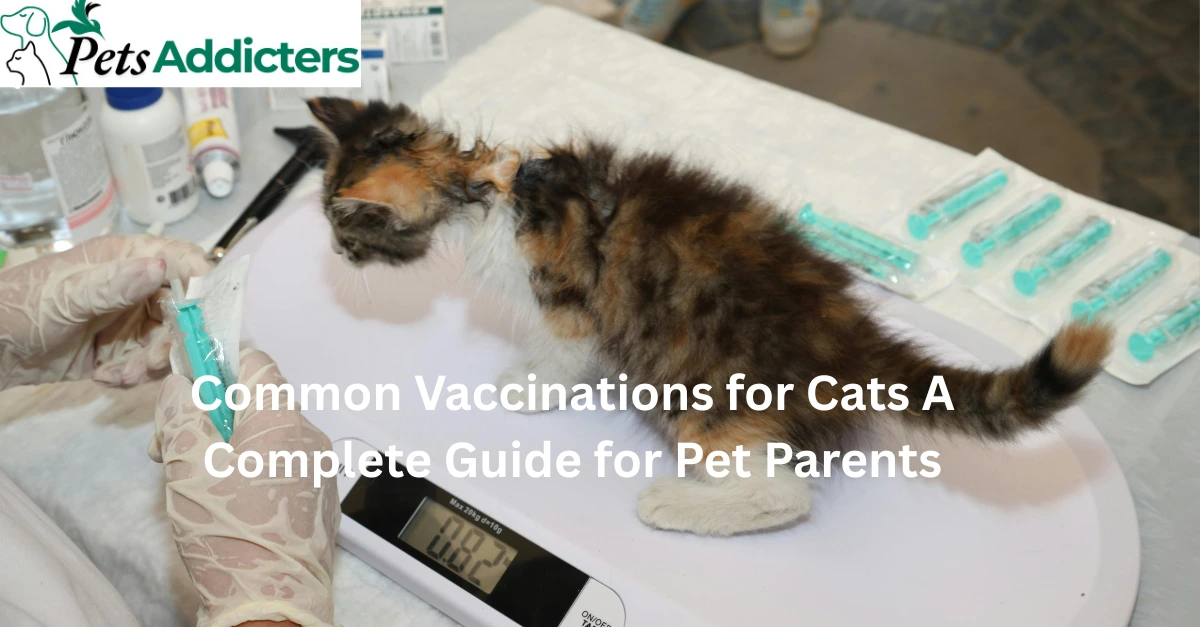Keeping your cat healthy goes beyond food, toys, and love it also means protecting them against dangerous diseases. One of the most effective ways to do this is through vaccination. Just like humans, cats need vaccines to boost their immune system and keep them safe from life-threatening illnesses. In this guide, we’ll walk you through the most common vaccinations for cats, why they’re important, and what pet parents should know.
Why Vaccinations Are Important for Cats
Vaccines prepare your cat’s immune system to fight off infections before they become serious. Some diseases are contagious between cats, while others can spread from outdoor environments. Even indoor cats can be at risk if viruses are brought home on clothing or shoes. Vaccinations not only protect your cat but also prevent outbreaks in the larger pet community.
Core Vaccinations for Cats
Veterinarians usually divide vaccines into two categories: core (essential for every cat) and non-core (optional, depending on lifestyle).
1. FVRCP Vaccine
- Protects against Feline Viral Rhinotracheitis, Calicivirus, and Panleukopenia.
- Often called the “distemper shot.”
- Usually given to kittens starting at 6–8 weeks of age and boosted regularly.
2 . Rabies Vaccine
- Rabies is a deadly disease that can affect cats, humans, and other animals.
- In many regions, this vaccine is legally required.
- Even indoor cats should receive rabies vaccination as a precaution.
Non-Core Vaccinations for Cats
These vaccines are recommended depending on your cat’s environment and lifestyle:
1. Feline Leukemia Virus (FeLV)
- Important for kittens, outdoor cats, or cats that live in multi-cat households.
- Helps prevent a highly contagious viral infection that weakens the immune system.
2. Bordetella
- Protects against a respiratory infection common in shelters or catteries.
3. Chlamydophila Felis
- Prevents conjunctivitis and respiratory illness.
- Usually recommended if your cat is at risk of exposure.
Cat Vaccination Schedule
- Kittens: Start at 6–8 weeks old, with boosters every 3–4 weeks until 16 weeks.
- Adult Cats: Require booster shots every 1–3 years depending on the vaccine type.
- Senior Cats: Should continue regular vaccinations, but schedules may be adjusted based on overall health.
Always consult your veterinarian for a tailored plan, since every cat’s needs are different.
Final Thoughts
Vaccinating your cat is one of the most responsible steps you can take as a pet parent. Core vaccines like FVRCP and Rabies are must-haves, while non-core vaccines such as FeLV or Bordetella depend on lifestyle. Regular check-ups and keeping up with your cat’s vaccination schedule ensure a longer, healthier, and happier life for your furry friend.
Your cat depends on you for protection and timely vaccinations are a simple but powerful way to keep them safe.
What are the core vaccinations for cats?
Core vaccinations include the FVRCP vaccine (protects against Feline Viral Rhinotracheitis, Calicivirus, and Panleukopenia) and the Rabies vaccine. These are essential for every cat.
Do indoor cats really need vaccinations?
Yes. Even indoor cats can be exposed to viruses carried on shoes, clothing, or through other pets. Vaccinations provide crucial protection.
How often should my cat get vaccinated?
Kittens start at 6–8 weeks old, with boosters every 3–4 weeks until 16 weeks. Adult cats need boosters every 1–3 years, depending on the vaccine and your vet’s advice.
Are cat vaccines safe?
Yes, cat vaccines are safe. Some cats may experience mild side effects like sleepiness or soreness, but serious reactions are very rare.

